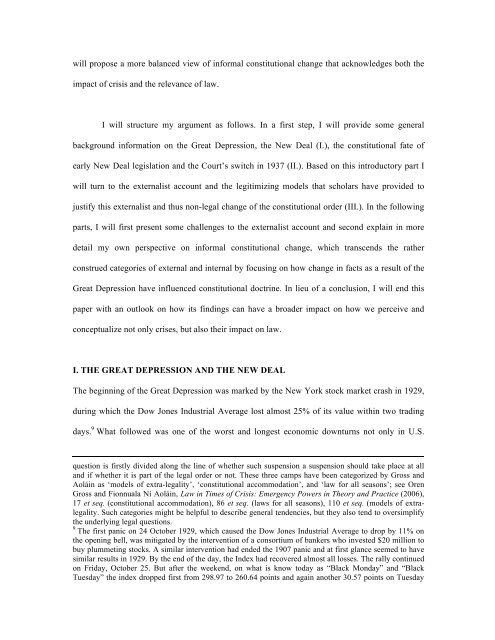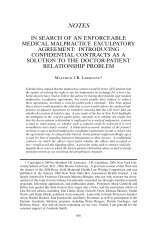Jasper Finke, Crisis and Law - New York University School of Law
Jasper Finke, Crisis and Law - New York University School of Law
Jasper Finke, Crisis and Law - New York University School of Law
You also want an ePaper? Increase the reach of your titles
YUMPU automatically turns print PDFs into web optimized ePapers that Google loves.
will propose a more balanced view <strong>of</strong> informal constitutional change that acknowledges both the<br />
impact <strong>of</strong> crisis <strong>and</strong> the relevance <strong>of</strong> law.<br />
I will structure my argument as follows. In a first step, I will provide some general<br />
background information on the Great Depression, the <strong>New</strong> Deal (I.), the constitutional fate <strong>of</strong><br />
early <strong>New</strong> Deal legislation <strong>and</strong> the Court’s switch in 1937 (II.). Based on this introductory part I<br />
will turn to the externalist account <strong>and</strong> the legitimizing models that scholars have provided to<br />
justify this externalist <strong>and</strong> thus non-legal change <strong>of</strong> the constitutional order (III.). In the following<br />
parts, I will first present some challenges to the externalist account <strong>and</strong> second explain in more<br />
detail my own perspective on informal constitutional change, which transcends the rather<br />
construed categories <strong>of</strong> external <strong>and</strong> internal by focusing on how change in facts as a result <strong>of</strong> the<br />
Great Depression have influenced constitutional doctrine. In lieu <strong>of</strong> a conclusion, I will end this<br />
paper with an outlook on how its findings can have a broader impact on how we perceive <strong>and</strong><br />
conceptualize not only crises, but also their impact on law.<br />
I. THE GREAT DEPRESSION AND THE NEW DEAL<br />
The beginning <strong>of</strong> the Great Depression was marked by the <strong>New</strong> <strong>York</strong> stock market crash in 1929,<br />
during which the Dow Jones Industrial Average lost almost 25% <strong>of</strong> its value within two trading<br />
days. 9 What followed was one <strong>of</strong> the worst <strong>and</strong> longest economic downturns not only in U.S.<br />
question is firstly divided along the line <strong>of</strong> whether such suspension a suspension should take place at all<br />
<strong>and</strong> if whether it is part <strong>of</strong> the legal order or not. These three camps have been categorized by Gross <strong>and</strong><br />
Aoláin as ‘models <strong>of</strong> extra-legality’, ‘constitutional accommodation’, <strong>and</strong> ‘law for all seasons’; see Oren<br />
Gross <strong>and</strong> Fionnuala Ní Aoláin, <strong>Law</strong> in Times <strong>of</strong> <strong>Crisis</strong>: Emergency Powers in Theory <strong>and</strong> Practice (2006),<br />
17 et seq. (constitutional accommodation), 86 et seq. (laws for all seasons), 110 et seq. (models <strong>of</strong> extralegality.<br />
Such categories might be helpful to describe general tendencies, but they also tend to oversimplify<br />
the underlying legal questions.<br />
9 The first panic on 24 October 1929, which caused the Dow Jones Industrial Average to drop by 11% on<br />
the opening bell, was mitigated by the intervention <strong>of</strong> a consortium <strong>of</strong> bankers who invested $20 million to<br />
buy plummeting stocks. A similar intervention had ended the 1907 panic <strong>and</strong> at first glance seemed to have<br />
similar results in 1929. By the end <strong>of</strong> the day, the Index had recovered almost all losses. The rally continued<br />
on Friday, October 25. But after the weekend, on what is know today as “Black Monday” <strong>and</strong> “Black<br />
Tuesday” the index dropped first from 298.97 to 260.64 points <strong>and</strong> again another 30.57 points on Tuesday
















